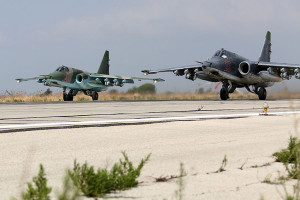
Russia’s realistic approach towards conflict-resolution in the Middle East was yet again proved to be right when ISIL hit the heart of France: Paris. The attack seems to have ‘shocked’ the West and forced it into viewing the real threat ISIL is actually capable of posing under the given circumstances. The change this attack has brought is quite evident.
It was only a month ago when French President had stated that Russia “is not our ally.” However, he is now quite willing to engage in talks with Russia’s Vladimir Putin to “unite their forces” against terrorism. Although the proposal to establish a “grand coalition” does not mean that it will happen as there are a number of issues, both political and strategic, to be resolved, however, the fact that Putin was able to bring Western powers round to the idea of such a coalition is yet another victory for him and Russia against terrorism.
What Russia has accomplished with a meagre force, consisting of three dozen war planes and an expeditionary force of 5,000 men, is not only remarkable but has also forced the US led ‘West’ into changing its otherwise destructive policies. The Obama-Putin resolve to have a “Syrian-led and Syrian owned political transition” is yet another evidence of Putin’s success in convincing the West of the vitality of transition, if it is to take place at all, through political rather than military means. The past four and a half year of fighting in Syria is an unmistakable evidence of the futility of the notorious Western policy “imposing” a so-called “transition” by virtually destroying the target country.
The success of the Russian narrative against ISIL and other terrorist organization as well as the success of its military against them on the ground has certainly taken Russia’s global standing to an entirely new level. And as a global player, it is now in a position to actually lead the would-be “grand coalition” in Syria.
Already, Vladimir Putin is reported to have ordered his commanders to co-operate with the French in its air-strikes against ISIL in Syria. Russia’s willingness to co-ordinate with French is quite evident from the order Putin has issued. It reads as follows:
“A French naval battle group led by an aircraft carrier will arrive in your theatre of action soon. You must establish direct contact with the French and work with them as with allies.”
The fact that French (and the ‘West’) is now willing to co-ordinate its campaign with Russia is, in fact, a strong approval of the Russian methods which were, until a month ago, considered to be “counter-productive” as well as “in-effective” in that Russian strikes were deliberately propagated as indirectly strengthening ISIL rather than eliminating it.
In fact, the biggest difference between Russia and the West has been, apart from the fact that the West has been supporting terrorist organizations in the Middle East, is military decisiveness. Faced with an American president who will not fight, and his European allies whose military capacity has shrunk to near insignificance, Putin was able to secure for Russia a formidable place in the Middle East which was, until Russia arrived, well on the course to becoming Eliot’s hypothetical Waste Land.
The Russian decisiveness and American indecisiveness is quite visible on the ground as well. While Russia has been indiscriminately targeting terrorists in Syria, only one in four American sorties has been dropping bombs on ISIL held territories. As a matter of fact, nearly 75 percent of U.S. bombing runs targeting ISIL in Iraq and Syria returned to base without firing any weapons in the first four months of 2015. The U.S. conducted 7,319 sorties over Iraq and Syria as part of Operation Inherent Resolve in the first four months of 2015. Of those, only 1,859 flights — 25.4 percent — had at least one “weapons release,” according to data provided by United States Air Force Central Command.
Although the officially stated reason for this lack of bombing was (and still is) the lack of ground intelligence. However, holding of fire has raised questions in the US about President Obama’s decisiveness in pushing back an enemy that has now come to threaten the Western heartland itself.
The American indecisiveness is, however, more of a reflection of the U.S.’ in particular, and the West’s in general, still unchanged policy towards ISIL. As Vladimir Putin revealed during the G20 summit that funding for ISIL continues to come unabated from almost 40 countries including some of G20 members. Apart from exposing the notorious “forty”, Putin also provided satellite images of the Islamic State’s lucrative oil smuggling operations.
These revelations, embarrassing as these were for the West, left an immediate impact. It seems to be a matter of great “coincidence” that no sooner had Vladimir Putin shown these pictures that US announced that its bombers had started to bomb ISIL oil tankers, implying as if they were aware of the precise location of these tankers but did not consider necessary to destroy them until Putin’s revelations about the West’s role in financing ISIL came to limelight.
Whereas these revelations by Vladimir Putin clearly amplify Russian decisiveness and seriousness in defeating and completely eliminating the world’s “richest” terrorist organization, it also reinforces the tacit continuation of Western in-decisiveness about not only eliminating ISIL but also its own relations with it.
Salman Rafi Sheikh, research-analyst of International Relations and Pakistan’s foreign and domestic affairs, exclusively for the online magazine “New Eastern Outlook”
